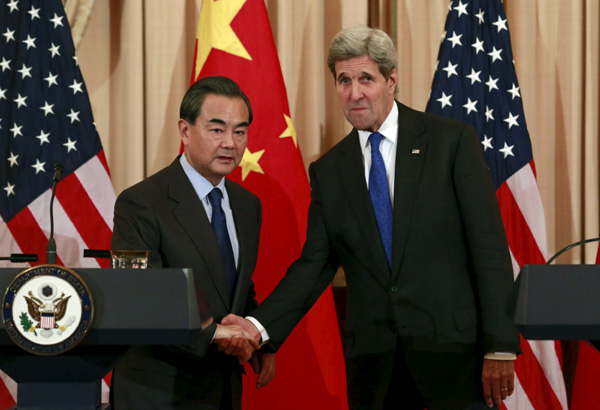Top diplomats' concerted notes serve region well
Updated: 2016-02-25 07:12
(China Daily)
|
|||||||||
 |
|
US Secretary of State John Kerry (R) and Chinese Foreign Minister Wang Yi shake hands at a joint news conference after their meeting at the State Department in Washington, February 23, 2016. [Photo/Agencies] |
Less than four weeks ago, United States Secretary of State John Kerry visited China. Now Chinese Foreign Minister Wang Yi is in the United States.
Their talks have by and large centered on the same topics-the Democratic People's Republic of Korea and the South China Sea.
If the short interval between the two meetings indicates the pressing nature of the issues at hand, the ray of hope that has emerged from the talks in Washington is proof that there is always a way out of an impasse if both parties are willing to search for one.
Perhaps even better. When the two countries' top diplomats last met, Beijing only agreed in principle to the United Nations Security Council taking "further measures" against Pyongyang's nuclear program. Now both are optimistic an agreement on the draft of a new UN resolution can be reached soon.
It is a shame that seven weeks after Pyongyang's fourth nuclear test and three weeks after its most recent rocket launch, in defiance of what was in effect a UN ban, international endeavors to denuclearize the Korean Peninsula bogged down because of related parties' inability to agree on how to respond.
Given the urgency to stop Pyongyang's nuclear adventure, we hope that their "near future" will not just be diplomatic rhetoric-the state of affairs on the Korean Peninsula brooks no more foot-dragging.
Beijing and Washington have spent too much time wrangling over the proper approach to persuade Pyongyang to abandon its nuclear weapons ambitions. So much so that they have actually distracted themselves from their professed shared goal.
Beijing will have been pleased to hear from Kerry that Washington wants "a negotiated outcome", and that its missile defense system would not be needed in the Republic of Korea "if we can get to denuclearization".
So with the key points of contention taken care of, there appears to be very high probability the two countries will be able to agree on a substantive new UN resolution.
Since denuclearization is the consensus and a negotiated outcome is in the best interests of all, they should strive to make sure the next UN resolution is able to rein in Pyongyang's nuclear program and sophisticated enough to prevent any hazardous fallout.
That, again, entails close coordination and cooperation between Beijing and Washington.
Related Stories
Washington does not want South China Sea to be US-China issue, Kerry says 2016-02-24 11:46
John Kerry visits China 2016-01-27 15:13
Goodwill sets tone at Wang, Kerry's briefing 2016-01-28 03:16
Chinese FM and Kerry hold talks to eliminate strategic doubts 2016-01-27 11:06
Today's Top News
Tech giants reveal 5G innovations in Barcelona
Mechanism to be built to monitor ceasefire in Syria
London mayor says to support Brexit in EU referendum
What ends Jeb Bush's White House hopes
UK to hold EU referendum on June 23
US saber-rattling could spark arms buildup: experts
Balkan, Austria police agree to register refugees
Turkey blames Kurds, Syria for attack
Hot Topics
Lunar probe , China growth forecasts, Emission rules get tougher, China seen through 'colored lens', International board,
Editor's Picks

|

|

|

|

|

|






